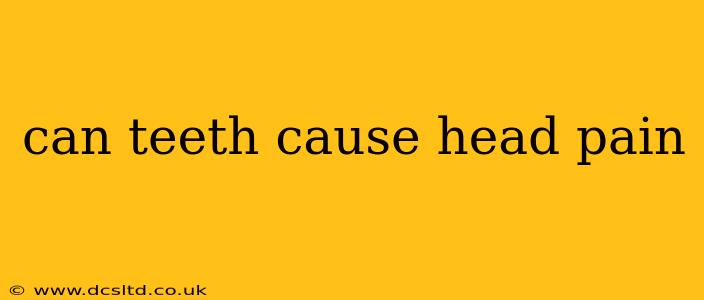Headaches are a common ailment, and while many causes exist, it might surprise you to learn that your teeth could be a contributing factor. The connection isn't always straightforward, but understanding the possible links can help you seek appropriate treatment and relief. This article explores the relationship between teeth and head pain, answering common questions and providing insights into potential causes and solutions.
How Can Teeth Problems Cause Headaches?
The intricate network of nerves and muscles in your head and jaw means that dental issues can easily trigger headaches. Pain signals originating from your teeth can be misinterpreted by your brain as originating from other areas, including your head. This is often due to referred pain, a phenomenon where pain is felt in a location different from its source. Several dental problems can lead to headaches:
-
Temporomandibular Joint (TMJ) Disorders: The TMJ connects your jaw to your skull. Problems with this joint, such as inflammation or misalignment, can cause pain radiating to the temples, jaw, and even the head. TMJ disorders are a frequent culprit in headaches linked to dental issues.
-
Bruxism (Teeth Grinding): Grinding or clenching your teeth, often unconsciously during sleep, puts immense strain on the jaw muscles and TMJ. This strain can lead to tension headaches, migraines, and even facial pain.
-
Dental Infections (Abscesses): Severe infections, like an abscess, can cause intense pain that spreads beyond the tooth itself. The inflammation and pressure can lead to throbbing headaches.
-
Sinus Infections: Although not directly related to teeth, sinus infections can sometimes be aggravated by dental problems, especially those affecting the upper teeth. The close proximity of the sinuses and upper teeth means inflammation in one area can affect the other.
-
Dental Procedures: Sometimes, procedures like extractions or root canals can cause temporary headaches due to inflammation or the lingering effects of anesthesia.
Can Cavities Cause Headaches?
While cavities themselves rarely directly cause headaches, the pain and inflammation associated with them can contribute to tension headaches or make existing headaches worse. Severe tooth decay can lead to infections, which, as discussed above, can trigger headaches.
What Kind of Headaches Are Linked to Teeth Problems?
Teeth problems are most often associated with tension headaches and migraines. The constant muscle tension from bruxism or TMJ disorders is a prime cause of tension headaches. Migraines can also be triggered by the stress and pain linked to dental issues.
How to Diagnose Headaches Related to Teeth?
Diagnosing headaches linked to dental problems requires a thorough examination by both a dentist and possibly a doctor specializing in headaches (neurologist). Your dentist will assess your teeth, jaw, and TMJ for any abnormalities, while your doctor may conduct neurological tests to rule out other causes. Imaging techniques like X-rays or CT scans might be used to identify problems with the TMJ or underlying infections.
How Are Headaches From Teeth Treated?
Treatment depends on the underlying dental issue. It can range from simple measures like stress management techniques (for bruxism) to more involved procedures like TMJ therapy, root canals, extractions, or even surgery in severe cases. Pain relievers might be prescribed for temporary pain relief, but addressing the root dental problem is crucial for long-term headache relief.
When Should I See a Doctor About a Headache?
Consult a doctor if your headaches are severe, frequent, or accompanied by other symptoms like fever, neck stiffness, vision changes, or numbness. Don't hesitate to seek professional help if you suspect your teeth might be playing a role in your headaches. Early diagnosis and treatment can prevent complications and improve your overall well-being.
This article provides general information and should not be considered a substitute for professional medical advice. Always consult with qualified healthcare professionals for any health concerns or before making any decisions related to your health or treatment.
